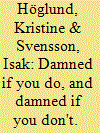| Srl | Item |
| 1 |
ID:
084485


|
|
|
|
|
| Publication |
2008.
|
| Summary/Abstract |
Third-party actors who mediate or monitor peace often strive to uphold an image of neutrality. Yet, they commonly face accusations of partiality. The Nordic engagement in the Sri Lankan peace process is an illustration of this puzzle: despite the efforts to uphold an image of being neutral mediators and monitors, they have been seen as favoring one side or the other. This article suggests that part of the explanation for their failure to be seen as neutral lies in the fact that armed conflicts are characterized by certain asymmetries between the main antagonists - in capabilities, status and behavior. These imbalances pose particular challenges to the third party aspiring to act in a neutral manner. We suggest that third parties have two strategies available to deal with imbalances in the relationship between the contenders: 1) they can choose to disregard the asymmetrical relationship and act in an even-handed manner or 2) they can seek to counterbalance the lopsidedness. This article explores the dynamics of these strategies by analyzing the Nordic involvement in Sri Lanka's peace process that began in 2002.
|
|
|
|
|
|
|
|
|
|
|
|
|
|
|
|
| 2 |
ID:
088758


|
|
|
|
|
| Publication |
2009.
|
| Summary/Abstract |
The awarding of the 2008 Nobel Peace Prize to former President Martti Ahtisaari, Finland, cites his involvement in the settlement of the Aceh conflict. This at the same time highlights the lack of such efforts in the regions of Southeast Asia and the South Pacific. While internal conflicts throughout the world often tend to be resilient to conflict management initiatives, conflicts in the Asia-Pacific region have proven to be particularly difficult to resolve. Internal conflicts in Southeast Asia and the Pacific often concern territorial issue, for instance, East Timor and ethnically based conflicts in Myanmar. This is also true for conflicts in the South Pacific, notably in Bougainville (Papua New Guinea) and New Caledonia (France). Territorial conflicts last longer, are more difficult to manage, and generally produce more adverse consequences than those over other issues such as ideology, government, and national power.
|
|
|
|
|
|
|
|
|
|
|
|
|
|
|
|
| 3 |
ID:
084491


|
|
|
|
|
| Publication |
2008.
|
| Summary/Abstract |
Low expectations and international impatience forced the African Union to shift from a classical integrative approach to negotiations to "deadline diplomacy" during the final months of the Abuja talks between the Sudanese government and the Darfur rebel movements. As a result, the AU mediators - who had served as communicators and formulators - assumed the responsibility of manipulators. This transition scuttled plans for gradually arriving at the implementing details for a formula. Instead, acquiescence to power served as the chief reason for the signature of one of the movements, while the mediators showed disinterest and inflexibility in reigning in the other two movements that required a package of additional threats and inducements. Important lessons regarding the credibility of deadlines, the appropriateness of the formula, the necessity of ownership, inclusivity/exclusivity of the talks, and sufficient support for the movements in the prenegotiation and diagnosis phases can be drawn from the Abuja process.
|
|
|
|
|
|
|
|
|
|
|
|
|
|
|
|